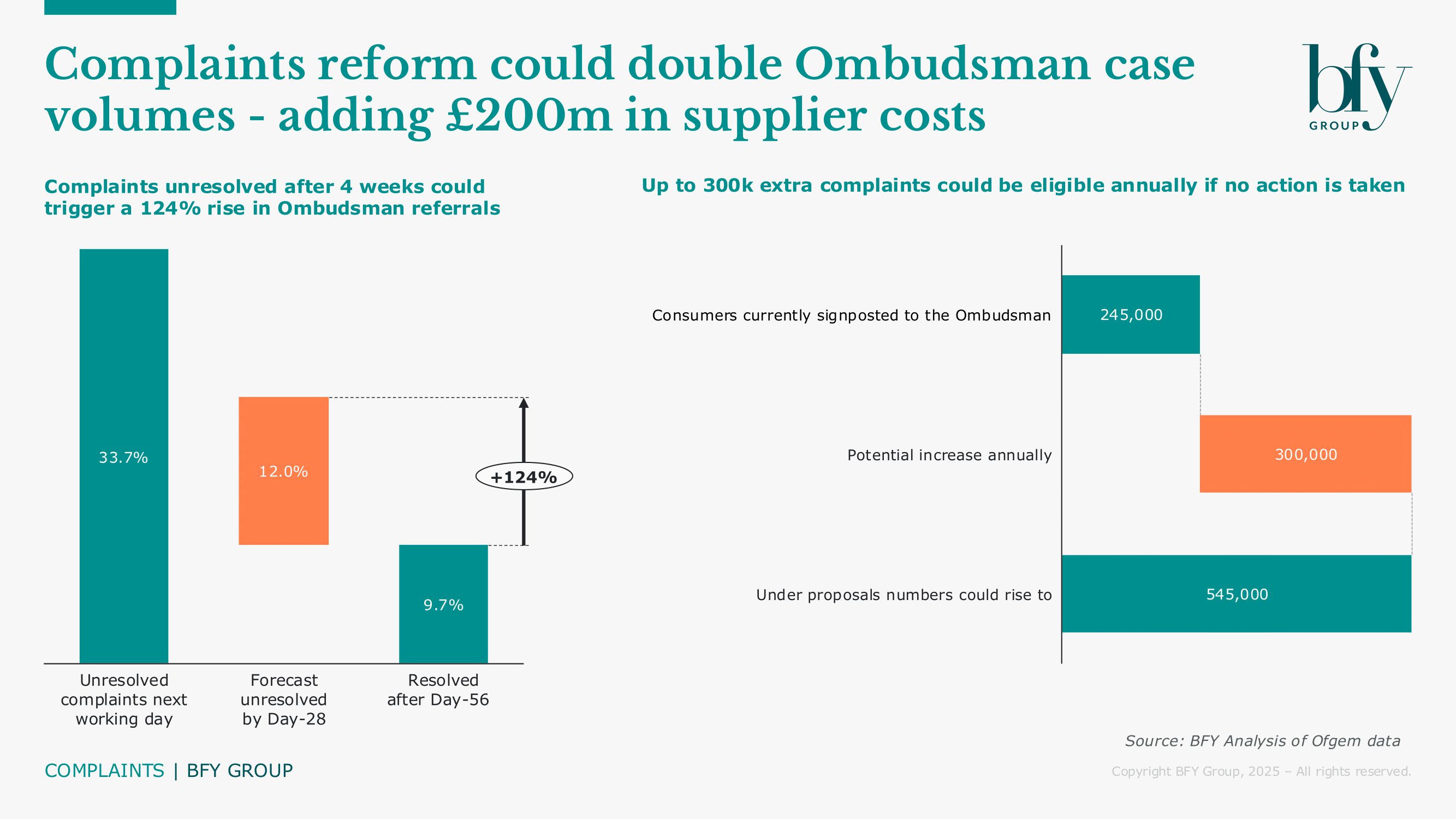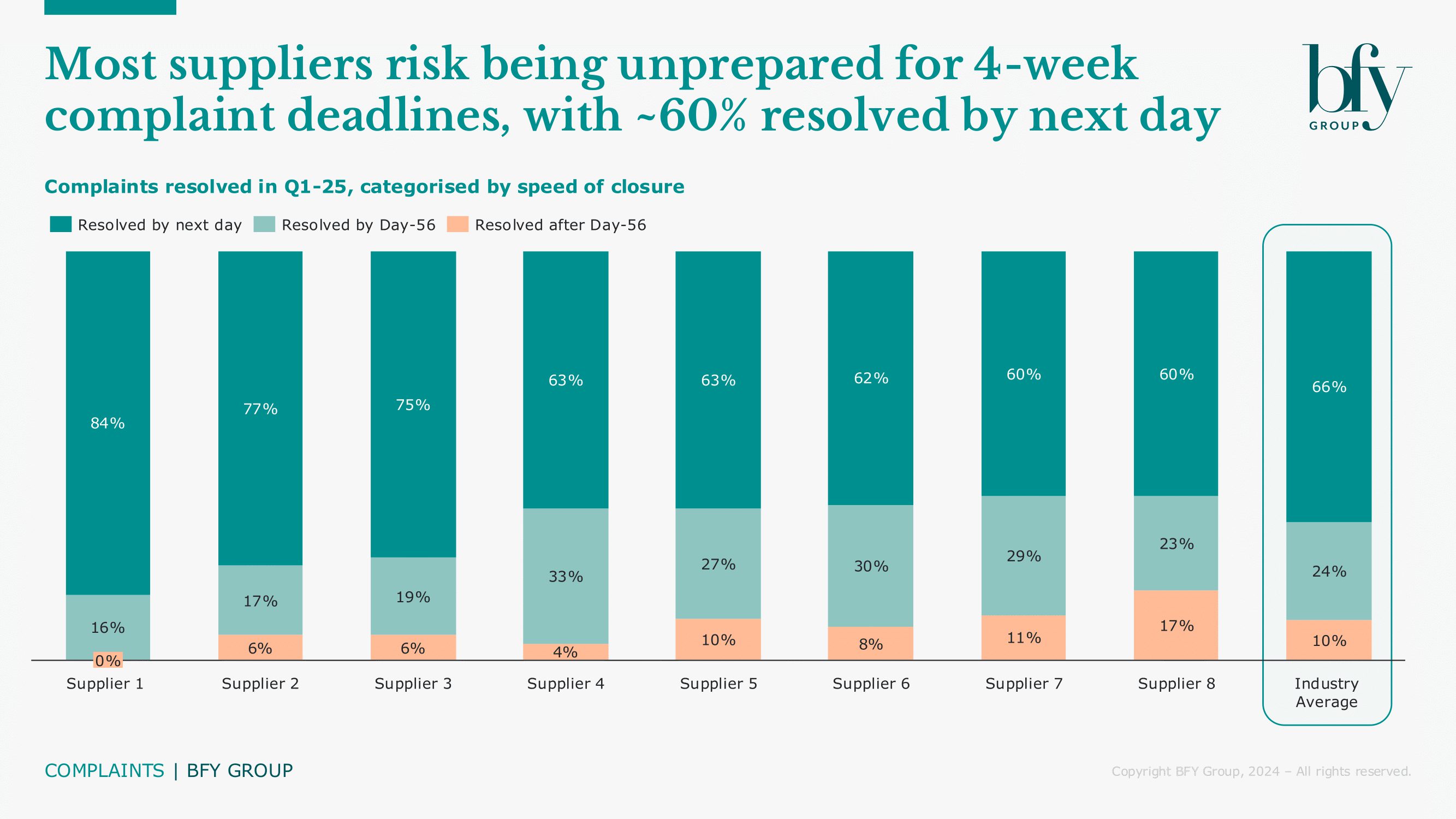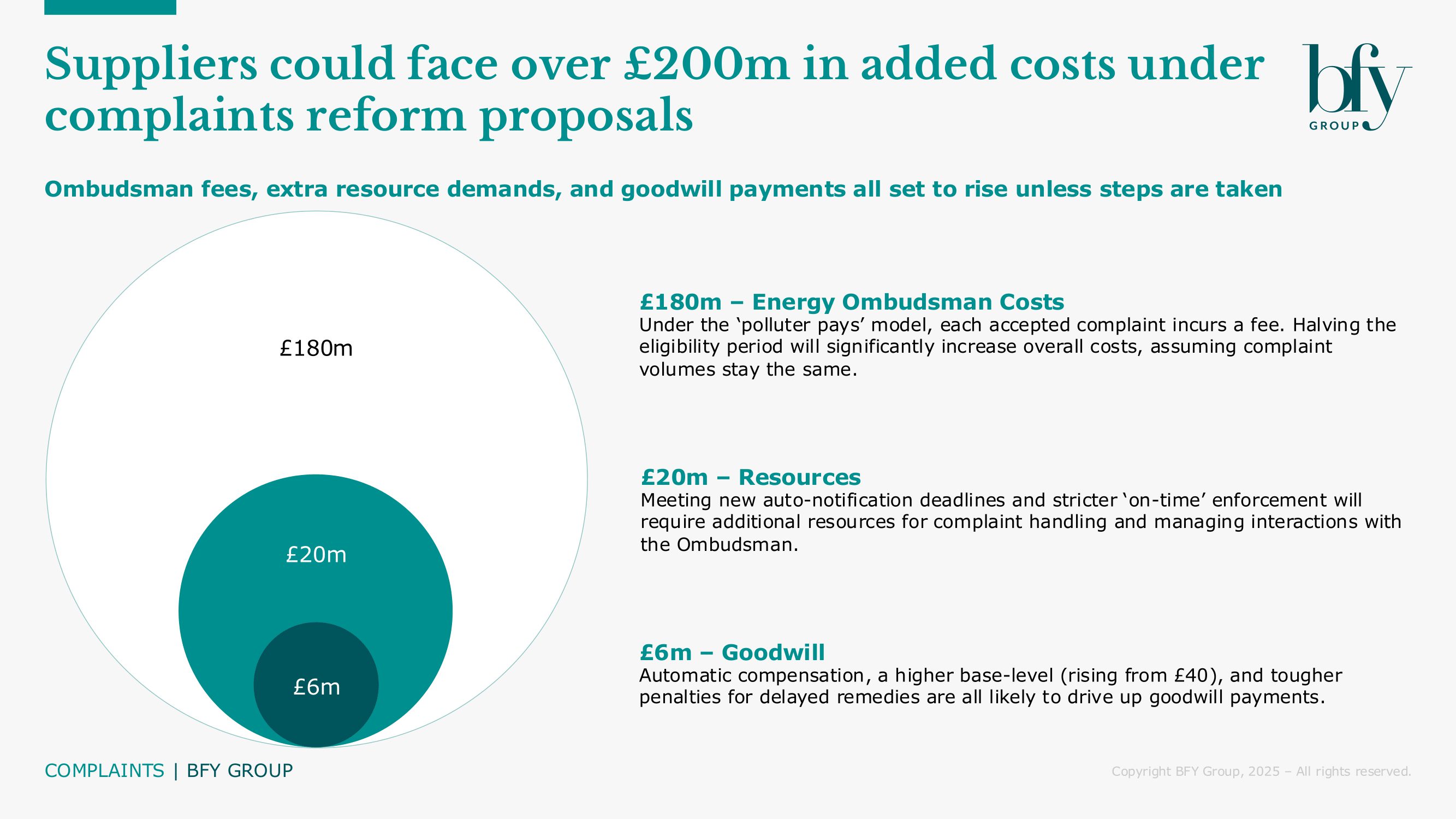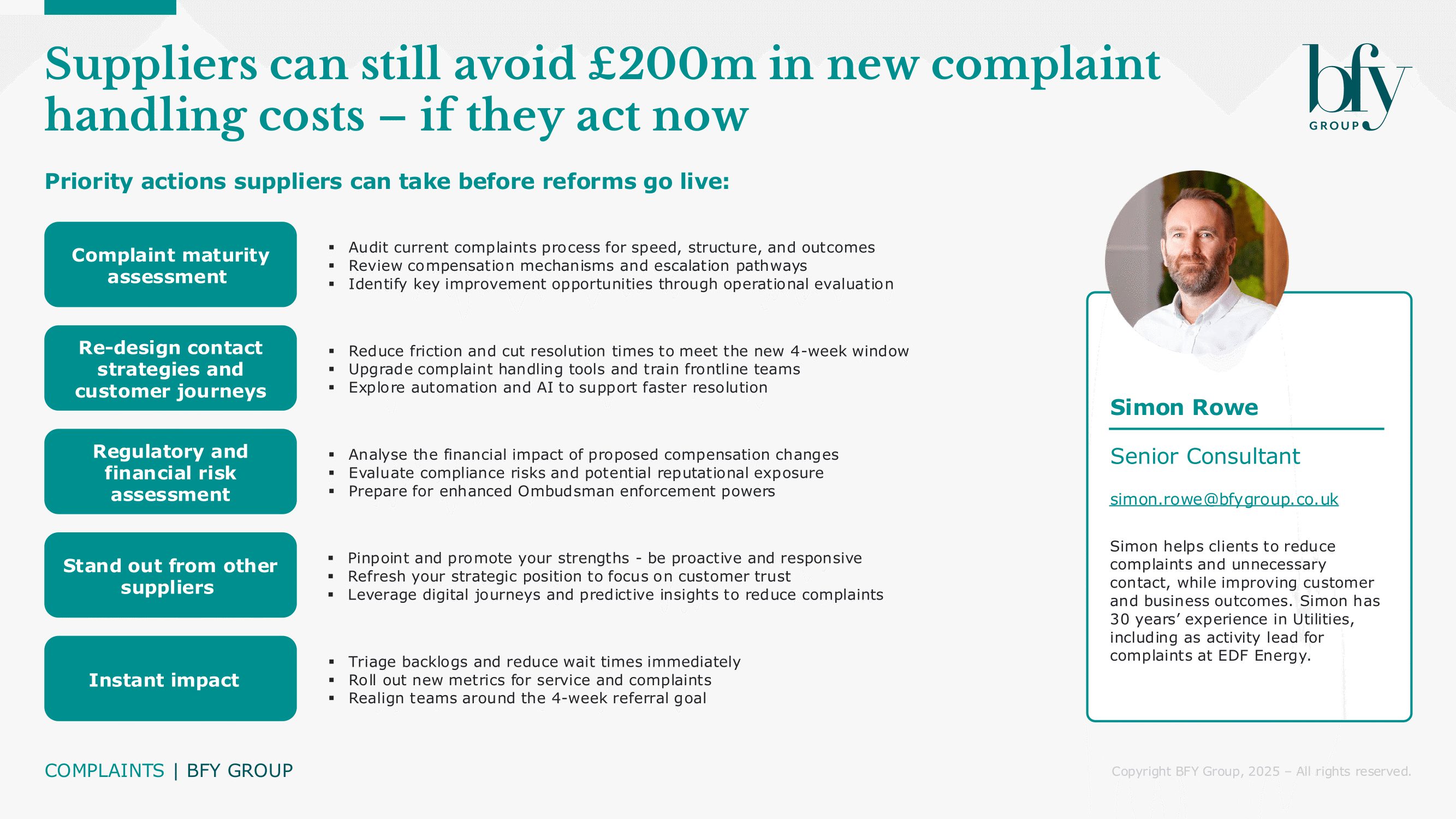New government proposals to reform the energy complaints process could make it fairer and faster for customers - but could also cost energy suppliers up to £200 million if they don’t adapt.
While suppliers have made real progress, with complaints down 28% since the start of 2024, the landscape is changing fast. The Government is now looking to overhaul how complaints are handled, putting more power directly into the hands of customers.
Energy Minister Miatta Fahnbulleh has been clear in her ambition to “create an energy market consumers can trust - one that puts an end to unfair practices, holds suppliers to account, and puts the customer first.”
At the same time, pressure is building from elsewhere. Citizens Advice recently told Parliament’s Cost of Energy Inquiry Committee that they supported a record number of people in 2024 with energy billing issues - around 60,000 more than any previous year on record.
One of the biggest proposed changes is that all customers would be automatically signposted to the Energy Ombudsman after just four weeks, down from the current eight. This shift alone could see an additional 300,000 complaints each year reaching the Ombudsman, a 124% increase, with serious cost and resourcing implications for suppliers.

Reducing the time customers must wait before escalating a complaint to the Ombudsman, from eight weeks to four, will understandably raise concerns across the industry. There are also several other proposed changes that could significantly impact how suppliers operate:
- An expanded automatic compensation scheme, potentially covering issues like a lack of response to complaints, incorrect billing due to unadjusted Direct Debits, or long call wait times.
- A review of the base-level compensation amount, currently £40, with the potential for an increase.
- Stronger enforcement powers for the Energy Ombudsman, to ensure suppliers comply with decisions and face consequences if they don’t.
Why are these proposals happening now?
The industry is trending towards faster services - same day switching, automatic reads via smart meters, and improvements coming through the Market-Wide Half-hourly Settlement initiative. These all indicate that faster processing and resolution are top of the agenda, but this hasn't been reflected though improved complaint performance.
At this point, these are still proposals, and formal recommendations are expected later this year. However they should still be taken seriously, given they’re part of a broader Government and Ofgem review.
Without supplier actions, costs could soar
Currently, around 10% of complaints remain unresolved after the 8-week mark - the point at which customers must be signposted to the Ombudsman. Performance varies between suppliers, but on average, only 60–63% of complaints are resolved by the next day.

If the referral window is halved to 4 weeks, and made automatic, unresolved complaints could skyrocket, potentially driving an additional 300,000 cases to the Energy Ombudsman each year. That’s a 124% increase, with a potential cost to the industry of over £200 million.
If suppliers don’t adapt, they could face rising costs in three key areas:
Additional Energy Ombudsman costs
Suppliers pay a fee for each accepted complaint. Suppliers won’t just worry about the shorter timeframe increasing volumes – they will also need to contend with the automatic referral process and the Energy Ombudsman engaging consumers at this stage.
Resources
The proposals suggest giving the Energy Ombudsman more powers. This means suppliers must follow through with final decisions and handle matters promptly, or face paying customers compensation.
This could result in suppliers needing double the specialist resources to fulfil their obligations on time, and avoid coming under regulatory scrutiny.
Goodwill payments
Failing to make meaningful improvements is likely to drive up goodwill payments - especially with Ofgem’s plans to expand the automated compensation scheme and increase payout levels.
Even if changes aren’t confirmed yet, a sharp rise in case volumes alone could bring added financial penalties and more customer reimbursements.
Relying on goodwill payments to delay escalation, without addressing the root cause, risks creating bigger problems further down the line.

How will the Energy Ombudsman manage the proposals?
These changes will also place significant pressure on the Energy Ombudsman itself.
To prepare, the Ombudsman may need to:
- Review internal processes and resourcing
- Implement a tiered settlement or triage system to manage volumes
- Enhance digital journeys for customers and suppliers
The longer-term goal should include better engagement with suppliers. Yes, this may include tougher enforcement action, but by providing quality insights and root cause analysis, they can also support suppliers to reduce complaints and enhance service across the sector.
Invest now and feel the benefits later
Suppliers have a window to prepare. While not yet confirmed, the direction of travel is clear. The Secretary of State’s involvement suggests change is likely - and the businesses that act now will be in a stronger position to manage costs and protect their customer relationships.
Here are five low-cost, low-regret actions suppliers can take now:
1) Complaint Maturity Assessment
Audit existing systems and processes. Are they robust enough to meet the proposed 4-week threshold?
2) Contact Strategy Review
Focus on early identification and resolution. Create a consistent, joined-up customer journey across all channels.
3) Financial and Regulatory Risk Assessment
Evaluate your exposure - what’s the cost of inaction if enforcement or penalties increase?
4) Differentiate Through Service
Review strengths and opportunities, look at areas to make a difference. Can your organisation stand out by being more proactive?
Look for ways to prevent complaints at the source and offer tailored solutions where needed.
5) Make an Instant impact
Clear backlogs, streamline internal processes, and remove known blockers. The benefits will be felt quickly.
This shouldn’t be seen as just another compliance cost - though suppliers do need to understand and manage their risk exposure. More than that, it’s an opportunity to rethink customer care, build trust, take a more proactive approach to engagement, and set your organisation apart from the rest of the market.

At BFY, we partner with boards and management teams to tackle their toughest challenges. If your organisation is preparing for these proposals and you want to take action now, contact Simon Rowe or Kevin Scott.
Simon Rowe
Senior Consultant
Simon helps our clients to reduce complaints and unnecessary contact, while improving customer and business outcomes.
View Profile

